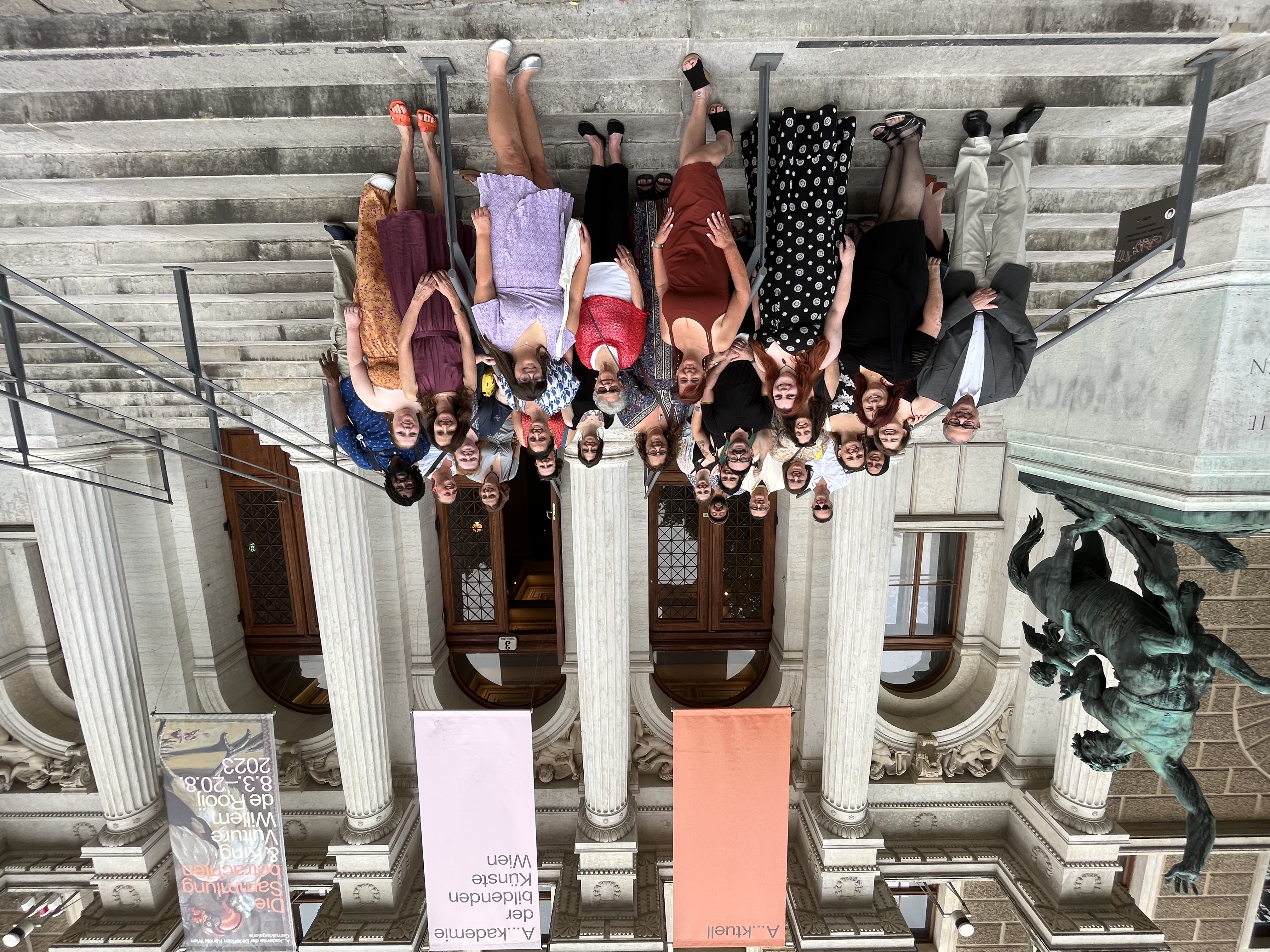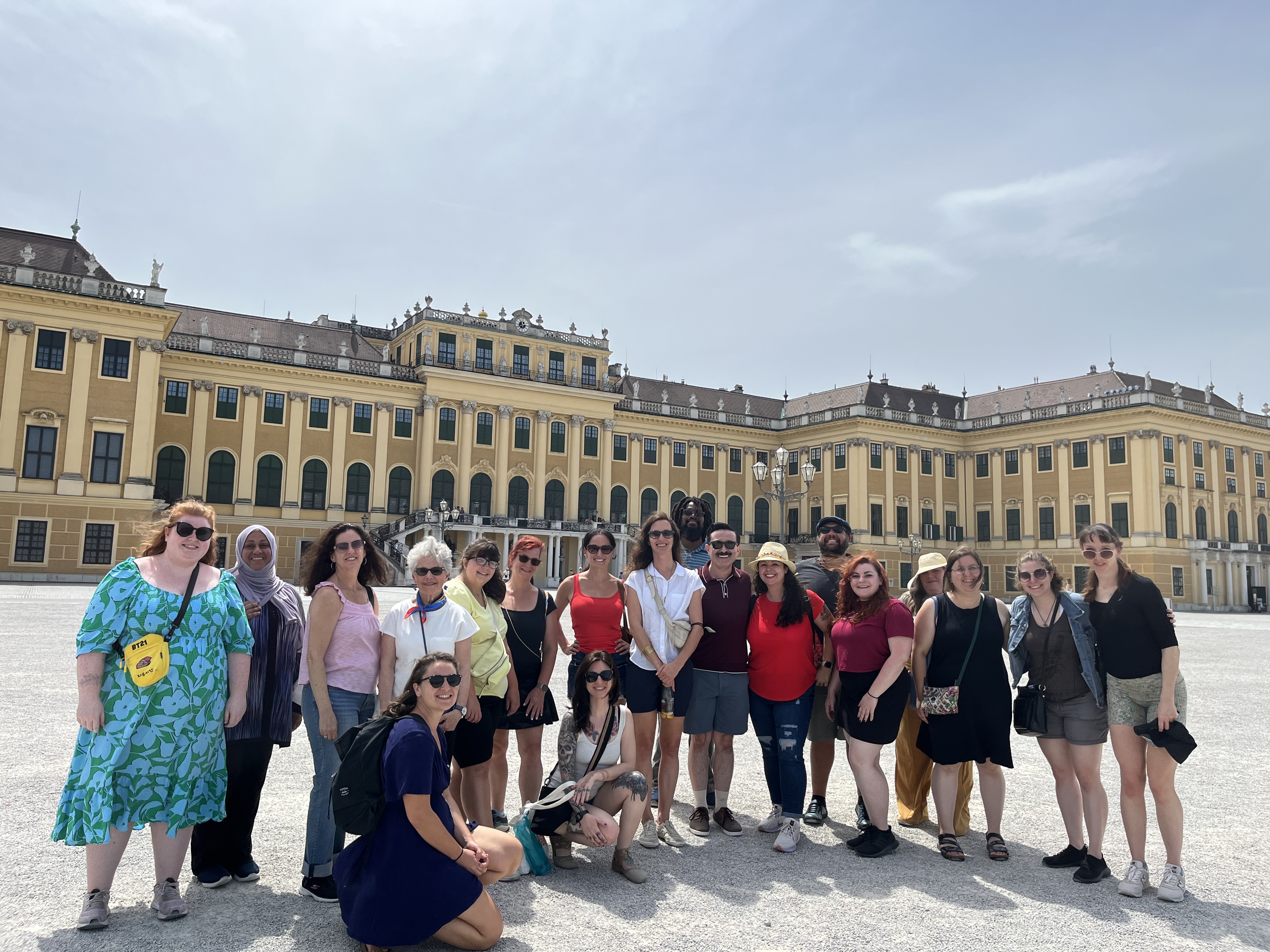Travel and the Low-Residency MFA: The Pan-European MFA Program at Cedar Crest College
Alison C. Wellford | November 2023

This summer, our Pan-European MFA low-residency cohort traveled from three continents to meet in Vienna, Austria, where we celebrated our tenth residency. Between slices of sachertorte in Secession-era coffeehouses and wandering the Versailles-inspired gardens of Schönbrunn Palace, we took part in faculty-led seminars and workshops, seminars taught by Austrian writers and scholars, student-led seminars and thesis presentations, and all the culturally immersive and authentic literary sightseeing we could squeeze in.
We featured a wide variety of seminars in Vienna, such as “Ekphrasis and Social Justice,” where our newest faculty member, poet Ruben Quesada, dove deep into what it means, both politically and personally, to write poetry in response to art in a city known for its world-class museums. Fiction faculty Robert Antoni’s seminar “Vernacular on the Page or How to Right Rong English?” interrogated the artificial hierarchy of institutionalized language to enter the language of the people with a focus on Caribbean voices, and invited speaker Angelika Reitzer’s seminar “No Poem! Lyrik und Lyrics” revealed the intersections between contemporary Austrian songwriting and the lyric in Austrian poetry and essays. Along with our personalized tour with one of the curators of the Ingeborg Bachmann exhibition at Vienna’s Literature Museum and rocking our student open-mic event, we still found time to cruise the Danube to Bratislava and soak in the thermal baths in Budapest for some creative relaxation.
We’ve designed an MFA program for fellow travelers because we know how vital travel can be to creativity. “Travel is an integral part of my creative process,” alumna Pearl Griffin said. “Some evenings in Barcelona, I sat with my double doors open wide, light low, and listened to the sounds of Spanish nights. I found myself experiencing that magical pull a writer feels when in the right place.” Travel can mean sensory awakening. It’s exposure to new cultures and ways of thinking. It asks students to think about their relationship to place and history, where even the classrooms are steeped in it. In Barcelona, we hold our seminars, workshops, and readings at the Ateneu Barcelonès, one of the few refuges for Catalan language and literature under Franco’s dictatorship, which now houses the second largest creative writing school in Europe.
The Pan-European MFA is the first MFA low-residency program with entirely international residencies, and we focus on three European cities: Vienna, Barcelona, and Dublin. We integrate writing from our host cities into our curriculum and visit the sites where many of the literary works take place—in Barcelona last year, we walked the streets of Orwell’s Homage to Catalonia, where our invited speaker Nick Lloyd, who practically carried a Spanish Civil War museum in his backpack, shared artifacts with us such as the iconic 1936 photo of Marina Ginestà in army uniform with a rifle to fight against the fascist military uprising and a bullet casing used by a child as a pencil holder during the war. We visited the Santa Maria del Mar, a cathedral in the Borne, where the bastaixos, or stone-carriers, in the historical novel La Catedral del Mar (Cathedral of the Sea) by Ildefonso Falcones transported stones on their back on arduous journeys from the quarry in Montjuic to construct the cathedral that towered before us.

But we’re not just literary tourists. In our craft seminars and workshops, we rigorously study the important contemporary American works featured by most US MFA programs while offering something more—a focus on writers often ignored by American readers and literary traditions that too infrequently make it to English-speaking creative writing classrooms. We want students to connect with the rich literary worlds outside US borders. In Barcelona, we learned about the little-known Catalan novel, Tirant Lo Blanch (The White Tyrant), that inspired Don Quixote. We beat out complex flamenco rhythms in Spanish poetry. We read bold contemporary Catalan voices. We organized a publishing panel with Barcelona-based Random House editors, agents, and literary scouts to learn about international publishing, including the immense influence Barcelona publishing houses and agents have had on Latin American literature starting with world-famous Barcelona agent Carmen Balcells, who radically shaped Latin American publishing and writing from the 1960s onward.
As we plan for the summer residency to come in Dublin at Trinity College and Botany Bay, where Oscar Wilde lived during his studies, we chatter about which lucky student might get assigned his room. Some of our invited speakers have included the folklorist and writer Éilís Ní Dhuibhne, winner of the Irish PEN award, whose stories weave Irish folklore into modern life. Outside Trinity College gates, we’ve allowed ourselves to get lost in The Yeats Library as well as along Grafton Street and St. Stephen’s Green, one of the most renowned literary neighborhoods in the world, where writers like Oscar Wilde, James Joyce, Lady Morgan, Bram Stoker, and Patrick Kavanagh congregated and living writers still do. Dublin is a UNESCO city of literature. It’s a city abundant with writing culture in a country that cultivates writers. As Irish poet Brendan Behan famously said, "Throw a stone into any pub in Ireland and you're sure to hit a poet."
As an MFA program based on travel, we aim for our students to leave the international residencies charged with new perspectives and experiences. Our program attracts a certain kind of student—ones with a touch of wanderlust as well as a sense of adventure, those who crave the creative spark that travel ignites in us. During our time traveling together, we can build a close-knit community of fellow writers who share a love for the written word. Our residencies support and develop students’ creative passions to give them agency as writers to pursue their dreams. As alumna Amy Lee Lillard put it, “One of the beautiful gifts of our annual residency is this: For two weeks, we can exist in a world where we are writers, above all else.”
